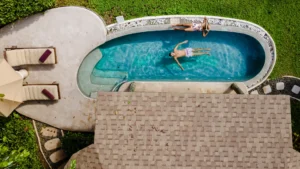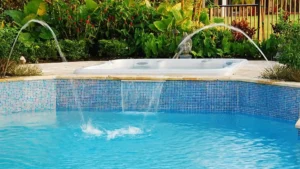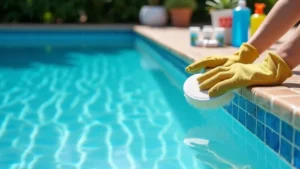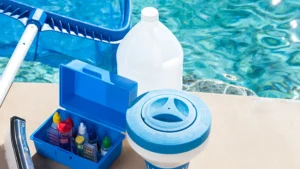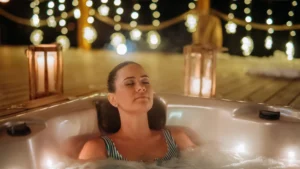
Cooler weather doesn’t stop us Floridians from enjoying a swim in our backyard pools … but that doesn’t mean we want to take a polar plunge, either. Even in February, our climate might accommodate outdoor swimming, but that can’t happen without a nice pool heater to warm up that cold water in cooler weather. This pool heater buying guide will help you choose the best heater to keep your pool comfortable all year round.
If you’re looking to turn your pool into a four-season feature, a reliable pool heater will do the trick. But which one should you choose? We’ve got you covered with our handy guide to the pool heater market. If you don’t see one on our list, don’t worry, we’ve got a great stock of pool heaters at our Miami showroom. Better yet, we can help with your pool heater’s installation, too!
Things to Consider Before Buying a Reliable Pool Heater
Before you start signing any checks, you need to know whether your equipment pad can accommodate another piece of gear. A heater is most often installed after your filtration system, so there needs to be at least 3–4 feet of room for the heater to fit into your rig.
Otherwise, you may need to invest in some rearrangement renovations.
Best pool heaters
Heat pumps

These are the most common and efficient types of swimming pool heaters to use in Florida. A heat pump takes the heat from the outdoor air, then transfers it to the pool water via a compressor and a heat exchanger.
Heat pumps are usually costlier than gas heaters. They consume significantly less energy and have a longer lifespan. Their efficiency decreases when the temperature drops to 50 degrees Fahrenheit.
Heat pumps are not effective in freezing temperatures; this issue is less concerning for residents of Florida.
Gas heaters

These can heat a pool very quickly, but do so at the expense of either natural gas or propane. They’re not as efficient as heat pumps, but the startup cost is much less. Gas heaters work well if you have a natural gas line in your house.
They are effective for small pools that heat quickly. They are suitable if you do not intend to keep your pool heated all winter.
What is the best pool heater to buy?
Heating? Cooling? Or Both Some heat pump models don’t just heat water, but are also able to bring the water temperature down in warmer months.
So, if your water is too cold in the winter and too hot in the summer, you might want to consider one of these options! Just look for a model notated as a “Heat and Cool” or “H & C” unit.
When choosing a pool heater, it’s important to consider the type of pool you have. If your pool uses salt water, you may wonder what the best pool heater is for this setup.
Intended Use and Size
Do you plan to keep the pool warm year-round, or just in the winter months? Are you using your pool every day in December, or just once in an ice-blue moon?
Is the heater dedicated to a backyard pool, or is it also providing auxiliary heat to your hot tub? Or maybe you’re not sure of the best pool heaters for Florida?
When considering the right pool heater for your needs, there are several important questions that can help you figure out the size and functionality you require. If you plan to use the heater only occasionally, a gas heater might be a suitable option for you, as it can provide quick heating when needed without being overly expensive.
However, if you have a larger pool or anticipate using the heater more frequently, you may want to think about upgrading to a larger heater that can accommodate your needs more effectively.
It’s essential to discuss these factors to choose the best pool heater in detail with your pool professional to ensure you find the most appropriate heater that meets both your size and usage requirements.
Our Best Pool Heater Brands
Best Overall Pool Heater
Gulfstream HE-2 Series

Pros:
- Great value
- Plastic cabinet withstands corrosion
- Energy efficient
- Ultra-resistant titanium heat exchanger
Pound for pound, dollar for dollar, we love Gulfstream’s quality and value. They’re heat pumps made by Floridians, for Floridians, designed specifically to withstand the Florida elements.
The plastic cabinet holds up over time against the salty ocean air. Speaking of corrosion, Gulfstream knows a thing or two about it. That’s why they use titanium heat exchangers to create a more durable, consistent heating experience.
If you’re looking for a great heater at an even better cost, this is it.
Best Pool Heater for On-And-Off Usage
Raypak Gas Heaters

Pros:
- Affordable startup cost
- Heat when you want it
- Functional in frigid temperatures
Maybe you’re using your pool for a few quick swims after making a New Year’s resolution, or you’re entertaining a wild pack of bored children. Raypak is the standard in gas pool heating system. It’s a fantastic draw for anyone who isn’t using their pool 365 days a year, or just wants to save some cash upfront.
You also have the dual benefit of quickly heating your pool for a short period of time … perfect for, say, a weekend holiday pool party?
Best Pool Heater for the Long Haul
AquaCal HeatWave SuperQuiet Series

Pros:
- Durable, long-lasting
- Smartphone controls
- Seriously efficient
For those looking to go the extra mile and put in a serious investment, AquaCal has you covered for longer. Like Gulfstream, AquaCal heat pumps boast a super-durable titanium heat exchanger, but they don’t stop there.
That’s because the SuperQuiet also delivers some of the best energy efficiency on the market, unit-to-unit.
FAQ's
1. What is the best pool heater for inground pools?
For inground pools, the AquaCal HeatWave SuperQuiet Series stands out as a top performer. It’s extremely quiet, energy-efficient, and built for long-term durability. Get a professional installation today.
2. Are heat pumps or gas heaters better for Florida pools?
Heat pumps are generally better for Florida pools. They use ambient air to heat your pool water, making them much more energy-efficient in warmer climates.
3. When should I choose a gas pool heater over a heat pump?
Gas pool heaters are ideal if you only heat your pool occasionally, need fast heating for short bursts (like weekend use), or already have a natural gas line installed. They’re also more effective during colder winter months when heat pumps lose efficiency.
4. What size pool heater do I need?
The size depends on your pool’s volume, your usage habits, and whether you’re also heating a hot tub. It’s best to consult with a pool professional especially to ensure quick and efficient heating.
5. Can a pool heater also cool the water?
Yes! Some heat pump models are designed to both heat and cool your pool water. These “Heat and Cool” (H&C) units are perfect for Florida homeowners who experience hot summers and want better year-round temperature control.
6. Is it hard to install a pool heater?
Pool heating services require planning. You’ll need about 3–4 feet of space on your equipment pad, typically after the filtration system. Professional installation is recommended to ensure proper setup and avoid complications.

